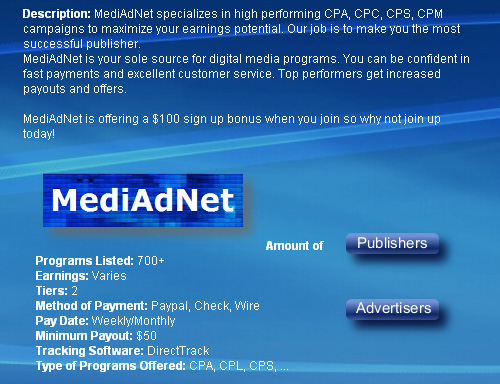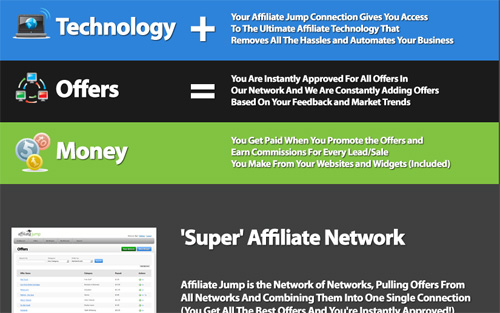5 Examples of Affiliate Program Scams
Posted on 02/18/2010
There are many online scams; this is a sad fact that you can't afford to neglect. With plenty of smart scamming schemes, you have to be very careful to keep your privacy and money safe. This article will provide tips on what signs to look for and some current examples of affiliate marketing scams so you can find the right affiliate programs for you.
1. Stealing Your Traffic
There is one thing about the traffic (your) affiliate site generates to the merchant's site: it is basically free until someone buys something. For the merchant to earn money from this free traffic is both unethical and dishonest. This is why monetizing a merchant's site with Adsense or any affiliate links is a huge no-no: affiliates work hard to drive traffic to the merchant's site; diverting this traffic is equal to stealing it.
Example: World Class Nutrition

 Description: An affiliate program promoting bodybuilding supplements as
part of ShareASale program. It attracted affiliates with good commissions and selection of rare products. Description: An affiliate program promoting bodybuilding supplements as
part of ShareASale program. It attracted affiliates with good commissions and selection of rare products.
 Red flags: Higher commission rate as compared to other programs in exactly the same niche. Red flags: Higher commission rate as compared to other programs in exactly the same niche.
 In reality: The program was stealing the affiliate traffic by redirecting it to another merchant selling the same products (and earning commissions on those sales). Quite naturally, affiliates got nothing from those sales. In reality: The program was stealing the affiliate traffic by redirecting it to another merchant selling the same products (and earning commissions on those sales). Quite naturally, affiliates got nothing from those sales.
 Lesson learned: Carefully research the merchant's site before joining the program. Look out for ads, affiliate links, alternative offers, etc - everything that can "steal" your traffic. Lesson learned: Carefully research the merchant's site before joining the program. Look out for ads, affiliate links, alternative offers, etc - everything that can "steal" your traffic.
2. Confusing Offers
It happens quite often actually: you are offered the huge number of benefits for becoming an affiliate and promoting the product but in reality you get nothing except spent money and wasted time.
Example: Apple Patch Diet (APD)

 Description: An affiliate program promoting a unique weight-loss product (patch) that did wonders. The program
offered $25 per referral sale, $25 sign-up bonus and "free affiliate web sites". Each APD affiliate website built for them would be "advertised" "every week by letting you use [their] powerful (SEWB) Search Engine WEBSITE BLASTER advertising
program",a search engine submitting software). Description: An affiliate program promoting a unique weight-loss product (patch) that did wonders. The program
offered $25 per referral sale, $25 sign-up bonus and "free affiliate web sites". Each APD affiliate website built for them would be "advertised" "every week by letting you use [their] powerful (SEWB) Search Engine WEBSITE BLASTER advertising
program",a search engine submitting software).
 Red flags: Sign-up fee ($29.95), dubious product. The fee is charged for setting up your "free" account (which already sounds shady). Red flags: Sign-up fee ($29.95), dubious product. The fee is charged for setting up your "free" account (which already sounds shady).
 In reality: Broken "free affiliate" sites, no sales reported for months and
wasted money. The sign-up bonus could not be received because it was below the pay-out threshold and the sign-up fee could not be refunded. Instead of a refund they "gave away" a free copy of SEWB. So with no sales
across the board, affiliates only had $25 sign-up bonuses which remained "virtual" forever. In reality: Broken "free affiliate" sites, no sales reported for months and
wasted money. The sign-up bonus could not be received because it was below the pay-out threshold and the sign-up fee could not be refunded. Instead of a refund they "gave away" a free copy of SEWB. So with no sales
across the board, affiliates only had $25 sign-up bonuses which remained "virtual" forever.
 Lesson learned: Carefully evaluate the product before promoting it. If you feel like the product might be scam or fake, chances are the affiliate program may be scam as well. It is important to believe in what you are promoting. Lesson learned: Carefully evaluate the product before promoting it. If you feel like the product might be scam or fake, chances are the affiliate program may be scam as well. It is important to believe in what you are promoting.
3. No Pay-outs Due To "Technical Problems"
Some affiliate programs try to look legit and refuse to pay due to "constant technical problems". This way most affiliates will give the program "the second chance" and continue promoting the product for free.
Example: 3HoursProfits

 Description: The site selling some incredibly effective money-making system, claims to pay 75% commissions (through ClickBank). Description: The site selling some incredibly effective money-making system, claims to pay 75% commissions (through ClickBank).
 Red flags: Insufficient contact information and well, bogus offer in itself. Red flags: Insufficient contact information and well, bogus offer in itself.
 In reality: At some point they just
stopped paying due to the "technical" problems: In reality: At some point they just
stopped paying due to the "technical" problems:
"Our prior affiliate panel has been disabled due to the massive spamming that had taken place, and is no longer accessible. Due to the cost and/or fines that were involved with the spamming that occurred,
previous affiliate commissions will not be disbursed. Instead they will be applied towards the cost and/or fines that have been and will be incurred due to the spamming violations.
The decision on this, although it may not seem fair - is a final decision, and also serves as notice to our members and affiliates as stated in our terms and conditions located on our website
 Lesson learned: If the offer seems to good to be true, it is most likely to be fake. Stay away from something that promises speedy income and suspiciously high profit. Lesson learned: If the offer seems to good to be true, it is most likely to be fake. Stay away from something that promises speedy income and suspiciously high profit.
4. Banning Affiliates Before Paying
Some affiliate programs pay you money until you earn a lot. Once you accumulate some substantial amount of earnings, you get permanently banned. You have now lost all the work you had put into building your affiliate site.
Example: MediadNet

 Description: The affiliate network offering "highest commissions", $100 sign-up bonus and all sorts of payment methods. Description: The affiliate network offering "highest commissions", $100 sign-up bonus and all sorts of payment methods.
 Red flags: Delayed pay-outs reported by many affiliates. Red flags: Delayed pay-outs reported by many affiliates.
 In reality: Once you earn a lot, you get banned (there's no way to sign in any more). In reality: Once you earn a lot, you get banned (there's no way to sign in any more).
 Lesson learned: Don't be tempted by high commissions. Only stick to trusted and reviewed affiliate networks. Lesson learned: Don't be tempted by high commissions. Only stick to trusted and reviewed affiliate networks.
5. Paid-for-inclusion Affiliate Programs
Affiliate programs should be free to join. Period. The merchant earns money from selling the product and the affiliate network earns percentage from the sales. The fact that the program is paid to join for an affiliate should mean that the product doesn't convert
and the only way for them to earn anything is actually making money from the affiliates that join.
Example: Affiliate Jump

 Description: The affiliate network having "best offers" on the market because they were "pulling offers from all networks and combining them into one single connection". Description: The affiliate network having "best offers" on the market because they were "pulling offers from all networks and combining them into one single connection".
 Red flags:
High sign-up cost and monthly fees; the lowest monthly fee is $99.95 option. On signing-up you have to pay $200 extra (account setup & activation fee). You are promised to get the sign-up fee back when you earn $1000 in commissions within 6 months (not automatically
- you'll have to ask for it). Red flags:
High sign-up cost and monthly fees; the lowest monthly fee is $99.95 option. On signing-up you have to pay $200 extra (account setup & activation fee). You are promised to get the sign-up fee back when you earn $1000 in commissions within 6 months (not automatically
- you'll have to ask for it).
 In reality: The service is awfully over-paid; there are plenty of problems including non-working affiliate links,
lots of program limitations and lack of affiliate support, etc In reality: The service is awfully over-paid; there are plenty of problems including non-working affiliate links,
lots of program limitations and lack of affiliate support, etc
 Lesson learned: Don't ever pay to be included in an affiliate program or (if you really want to) do thorough
research of affiliate program reviews before paying. Lesson learned: Don't ever pay to be included in an affiliate program or (if you really want to) do thorough
research of affiliate program reviews before paying.
 What Can You Do If You Get Scammed? What Can You Do If You Get Scammed?
First thing to keep in mind is that you can't afford to be scammed. Never go for shady sites or overly enticing offers. Do thorough research before joining any program and use your common sense.
If you still got scammed (no one can be absolutely safe from that, right?), there's not much you can do. Two options (it is advisable to do both):
- Contact your local or federal agencies that have the power to investigate and shut down scams.
- Be sure to share your sad experience online to warn others and draw attention to the scam.
|